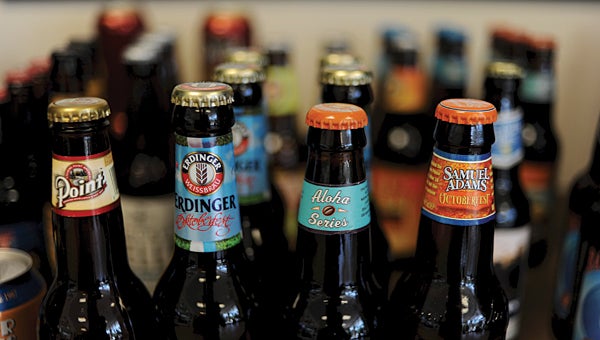County deciding Sunday alcohol sales March 1
Published 12:25 pm Wednesday, January 20, 2016

Shelby County voters will decide on March 1 if the county will allow the sale of alcohol after noon on Sundays. (File)
By NEAL WAGNER / Managing Editor
Shelby County voters will decide during a March 1 election if they want to allow alcohol sales in the county after noon on Sundays, and the issue is drawing strong opinions from both sides.
State Rep. Mike Hill, R-Columbiana, sponsored a local amendment to the Alabama Constitution in the Alabama House of Representatives during last year’s legislative session. State reps. Matt Fridy, R-Montevallo, and April Weaver, R-Brierfield, co-sponsored the bill.
The state House of Representatives passed the bill by a vote of 65-0 on March 19, 2015, and the Alabama Senate approved the bill 26-0 on April 9, 2015.
As a result of the bill’s passage, the issue will come to a public vote during the presidential primary election on March 1. The issue will be on both Republican and Democrat ballots.
The issue has drawn support from many local leaders, who said the lack of Sunday alcohol sales is hindering the county’s economic development efforts, particularly with new restaurants.
Hill previously said his decision to sponsor the legislative bill was “strictly economic,” and said it will end the county’s current private club license system dealing with Sunday sales. Sunday alcohol sales currently are outlawed in Shelby County for businesses without a private club license.
The state Alcoholic Beverage Control board did away with private club licenses several years ago, but grandfathered in businesses already holding the licenses at the request of state legislators.
While some Shelby County businesses currently hold private club licenses through the grandfather clause, new businesses are not able to obtain the licenses.
Alabaster Mayor Marty Handlon, whose city has seen rapid economic growth over the past several years, said she is “fully in support” of allowing Sunday alcohol sales, and said it will help the city and county to continue its growth.
“So many people are leaving Shelby County and traveling to Jefferson County to go eat at nice restaurants on Sundays. We need to keep those tax dollars here,” Handlon said. “Even as a Christian, I support it because legislation can’t be used to dictate moral balance.”
Greater Shelby County Chamber of Commerce Director Kirk Mancer said the chamber has not taken a stance on the issue, but has commissioned a study examining the impact Sunday alcohol sales would have on the county’s economy. The results of the study likely will be released by the end of January, he said.
The potential of Sunday alcohol sales have also drawn criticism.
Dr. Joe Godfrey, the executive director of the Shelby County-based Alabama Citizens Action Program, said he views Sunday sales as an expansion in the availability of a “mind-altering and addictive drug,” and criticized the increased availability of higher-quantity, higher-alcohol beverages in Alabama over the past several years.
“Will selling alcohol in Shelby County on one more day each week result in a noticeable increase in alcohol-related problems? Probably not,” Godfrey wrote in an email. “But, Sunday alcohol sales, together with all the other expansion of alcohol that is taking place, is already having a negative impact on our culture.
“Shelby County, where I live and work, is a wonderful county! We have grown in population and we have grown financially for several years without Sunday alcohol sales,” Godfrey wrote. “People have left other counties where Sunday sales are legal to move to Shelby County. Citizens of Shelby County need to ask themselves, ‘Do we really want to become like everyone else or do we want to keep Shelby County unique and special? Do we want to keep Shelby County a great place to work and raise a family?’”









